|
|
| |
��
�w���E�̉p�ꋳ�� (���w�Z)�x[�C������]
 New!
New!
| Hello from Iran! (�C�������炱��ɂ��́I)
By Mina Hisada/Illustration by Puri |
|
����̓��W�́A�C�����B���{���o�u�����}����1980�N��㔼����1990�N��O���ɂ����āA������u�W���p���E�h���[���v�����߂đ吨�̃C�����l���������܂����B���ꂩ��10�N�ȏソ�������ł��A���{�ɑ؍݂���C�����l�̐���5,000�l����Ƃ����Ă��܂��B����ȓ��{�Ő��������Ă���C�����l�̒��ɂ͓��{��𗬂��傤�ɂ���ׂ�l�������A�ނ�ɑ��āu�O������K������̂����Ȑl�����v�Ƃ�����ۂ����l������̂ł͂Ȃ��ł��傤���B
(This month, we feature Iran. During the bubble years - the late 1980s to the early 90's - many Iranian workers came to Japan with a "Japanese dream." There are more than 5,000 Iranians now in Japan, and most of them speak Japanese fluently. They appear to be a people who are skilled at learning foreign languages.)
|
|
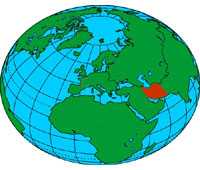 ��4��ڂ̍���́A
��4��ڂ̍���́A
�C�����̏��w���ɃX�|�b�g���C�g��
���Ă܂��B
|
|
 |
| Photos by Barbara Cwioro |
�������A���Ƃ��Ă͂ǂ�Ȉ�ۂ�����ł��傤���B���́A���̍��قǏ���Ȃ��A�������Ă��鍑���������̂ł͂Ȃ����Ǝv���܂��B��ʓI�Ɏ�����Ă���C���[�W�Ƃ��āA�u�O�ꂵ���j����ʁv�u���i�ȃC�X�������̍��v�u��͍~��Ȃ������̍��v�Ȃǂ�����̂ł͂Ȃ��ł��傤���H�ʂ����Ă��̎��Ԃ͂ǂ��Ȃ̂ł��傤���H�����āA�C�����̖�����S���A���w���̋����p�ꋳ��͂ǂ��Ȃ��Ă���̂ł��傤���H
(But what kind of impression do you have of their country? There are few more misunderstood countries than Iran, mostly because there is a lack of information about the country. Is a place where men and women are kept apart? Is it a closed society ruled by strict Islamic codes? Is it a desert country where snow never falls? What is the Iranian reality? What is going on in their elementary schools? How are the students, who hold the nation's future in their hands, taught? What about their English education?)
����́A���n�̏��w����ʂ��āA���̍��̎�Ɍ�w����𒆐S�ɁA�C�����̌����T���Ă݂����Ǝv���܂��B
(Let's explore the language-education questions by looking at some Iranian elementary school students.)
���C�����ЂƂ���������
�� �C�����͑��������ƁB���̂��߁A���p��̃y���V����̂ق��A�g���R��A�N���h��A�A���r�A��Ȃǂ��b����Ă��܂��B�܂��A����Љ��{�i�I�Ɍ}���n�߂����{�Ɣ��ɁA�Ⴂ�l�����ƂĂ������A30�Έȉ��̐l�����S�l����60�����߂Ă��܂��B
(Iran is a multiethnic country. Besides Farsi, the main language, Turkish, Kurdish and Arabic are spoken. Also, contrary to Japan, there is a high proportion of young people. More than 60 percent of the population is under 30.)
|
��PART 1
�����̂��F�B�i1�l�ځj�F�C�����̃Z�s�f�����i9�j
(Today, we have here Sepideh, who is 9 years old.)
|
|
| |
|
|
| |
|
|
|
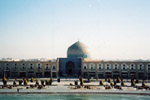 |
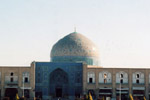 |
 |
 |
(�C�X�t�@�n�[���E���̍L��)
|
(�C�X�t�@�n�[���E���X�N) |
(�e�w�����̐Ⴞ���) |
(�J�V���[���̒뉀) |
|
|
��PART 1
�����̂��F�B�i2�l�ځj�F�C�����̃��C�n�l�����i12�j
(Today, we have here Reeyhaneh, who is 12 years old.)
 �������ƃ��C�n�l�����̐����������܂� �������ƃ��C�n�l�����̐����������܂�

 ���C�n�l-- Reeyhaneh
���C�n�l-- Reeyhaneh
���̖��O�́A���Ԃ̖��O���炫�Ă���́B
(My name is Reeyhaneh. I am named after a kind of flower.)
|


 �C�����̎��l�A�\�n���u�E�Z�y���ł��B
�C�����̎��l�A�\�n���u�E�Z�y���ł��B
(My hero is " Sohrab Sepehri", Iranian poet.)
|
 
 ��i���B����ɓ��{�l�͓����҂��Ǝv���B
��i���B����ɓ��{�l�͓����҂��Ǝv���B
�iJapan is an advanced country and Japanese people are hard working.)
|
|
| |
|
|
| |
|
��PART 1
�����̂��F�B�i3�l�ځj�F�C�����̃A������i11�j
(Today, we have here Ali, who is 11 years old.)
 �������ƃA������̐����������܂� �������ƃA������̐����������܂�

 �A��--Ali
�A��--Ali
�Ӗ��́u��ԁv����B
(My name is Ali. It means ' Best'.)
|


 �f�C�r�b�h�E�x�b�J���I��A�̎�̃u���g�j�[�E�X�s�A�[�Y�A�����ăC�}���E�A���i�C�X�������̎w����)�ł��B
�f�C�r�b�h�E�x�b�J���I��A�̎�̃u���g�j�[�E�X�s�A�[�Y�A�����ăC�}���E�A���i�C�X�������̎w����)�ł��B
(My hero is " David Beckham", "Britney Spears" and "Imam Ali".)
|


 �ƂĂ��i��ł��鍑�B���{�l�͋K���������āA��V�������āA�A�N�e�B�u�Ȑl�������Ǝv���B
�C�����̕����Ǝ��Ă���Ƃ��낪����Ǝv����B
�ƂĂ��i��ł��鍑�B���{�l�͋K���������āA��V�������āA�A�N�e�B�u�Ȑl�������Ǝv���B
�C�����̕����Ǝ��Ă���Ƃ��낪����Ǝv����B
�iJapan is a very advanced country. Japanese people are very orderly, polite and active.
I think their culture is similar to Iranian.)
|
|
| |


 �l�͗̕��e�Ɖp��̐搶�ł��B
�l�͗̕��e�Ɖp��̐搶�ł��B
(My treasure are my parents and my English teacher.) |
|


 �傫���Ȃ�����A�T�b�J�[�I��ɂȂ�I
�傫���Ȃ�����A�T�b�J�[�I��ɂȂ�I
(My dream is to become a football player.) |
|
| |
|
|
|
 |
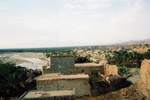 |
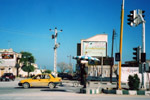 |
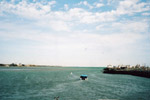 |
(�o���_���A�b�o�[�X�x�O1)
|
(�o���_���A�b�o�[�X�x�O2) |
(�P�V����) |
(�y���V���p) |
|
|
��PART 2
�����̏��w�Z�ɒʂ��A�������1��
A typical day for Ali)(^o^)��

| TIME |
WHAT I DO |
| 7:00-7:30�@ |
����(Morning assembly) |
|
8�F00-8:45 |
�y���V����(Farsi)
|
|
8�F45-8:55 |
10���ԋx��(10 minutes break)
(o�E_�Eo)
|
|
8:55-9:40 |
�Z��(Math)
|
|
9:40-9:50 |
10���ԋx��(10 minutes break)(o�E_�Eo)
|
|
9�F50-10:35
|
�y���V����(Farsi)
|
|
10:35-10:45
|
10���ԋx��(10 minutes break)
(o�E_�Eo)
|
|
10�F45-11�F30
|
�R�[�����iHoly Qur'an)
|
������
(Note) |
���C�����̏��w�Z�́A�ߑO���ŏI���w�Z�ƌߌォ��n�܂�w�Z������܂��B
�A������̊w�Z�͌ߑO���ŏI���܂��B
�܂��A�C�����̊w�Z�Ɠ��{�̊w�Z�͂���ȂƂ��낪�Ⴄ�B
(The difference between Iranian and Japanese elementary schools are as follows.)
�����w�Z���獂�Z�܂ŁE�E�E
���j���ʊw�ł��B(The girls and boys study separately.)
�����y�̎��Ƃ��Ȃ��B�K��������A�l�I�ɉ��y�����֍s���B
(There is no 'music lesson'. If you want to learn it, you need to take private,
individual lessons after school.)
�����w�Z�ł́E�E�E
�� ���w�Z��N������u�R�[�����i�C�X�������̐��T�j�v�̎��Ԃ������B
(We study the Qur'an from first grade.)�@
�����w�A���Z�ł́E�E�E
���푈�A�n�k�A�^���ȂǂɑΉ����邽�߁uDefense(��@�Ǘ�)�v�̎��Ƃ�����B
(We also take a class called Defense for two years, from Grade 8 to Grade 9.
The war between Iran and Iraq was the reason why this subject was introduced into the curriculum.)
���܂��́A�ꍑ��u�y���V����v���厖�I�@������A�O����͒��w���ɂȂ��Ă���K����B�Ⴆ�Β��w��N���ŃA���r�A��A�p��������B
(First of all, my native tongue - Farsi - is important! We will have the chance to learn foreign languages when we finish elementary school.)
|
|
|
��PART 3
�C�����l���b���p��́A�ǂ̂悤�ȓ���������ł��傤���B
(What are the characteristics of Iranian English?)
|
��
���� (Characteristics )
��������1(Characteristic 1)����
���s�g�̔��������ɂ���
�i�Q�l�F�����A�A���r�A��ɂ͂��̔��������邽�߁A�A���u�̐l�����ɂƂ��Ă͂₳�����j
(It's difficult to pronounce 'TH", because there is no such sound in Farsi.
However, it's easy for Arabs, because they have this sound in Arabic.)
|
��������2(Characteristic 2)����
���Z�ꉹ�ƒ��ꉹ�̔��������ɂ����B
(It's difficult to pronounce short and long vowels.)
��j�e�n�n�k���e�t�k�k
(For example, FOOL and FULL)
��j�k�h�u�d���k�d�`�u�d
(For example , LIVE and LEAVE)
��j�r�g�d�d�o���r�g�h�o
(For example, SHEEP and SHIP)
|
|
��������3(Characteristic 3)����
���h�A���ӂ��H�H
(When I say "door", it means "Cap"??)
���y���V����ł́u�h�A�v�Ƃ����P��ɂ́u�ӂ��v�̈Ӗ������邽�߁A�ȉ��̂悤�Ȗʔ�������������邱�Ƃ�����܂��B




|
|
[[�@���ڂ̊G]]
��j
�C���������A�s�X�^�`�I��H�ׂ�Mohammad��Rieko�B���낻��H�זO�������Ƃ�������̉�b�B
�iMohammad and Rieko are having Pistachio.They are getting tired of eating them.)
[[�A���ڂ̊G]]
Example:
Mohammad: Could you close the door, Rieko?
�i�˂����b�q�A�h�A�߂Ă���Ȃ� �H�j
�������{�l�́A�u�s�X�^�`�I�̊ʂ̂ӂ��߂Ă���Ȃ��H�v�Ƃ����Ă������B
[[�B���ڂ̊G]]
Rieko: Mmm? The door is already closed. What do you mean, Mohammad?
(���[�H�h�A�Ȃ�܂��Ă��邯��ǁI�I�ǂ��������ƁH)
Mohammad:No, it's still open.
(Pointing at the cap on the jar of pistachios.)
[[�C���ڂ̊G]]
�i[�ʂ̂ӂ����w�����Ȃ���]����A�J���Ă�ł��傤�j
Rieko: Oh, I see! You mean the "cap"!!
(�����A�ӂ��̂��ƂˁH)
|
|
��PART 4
�C�����̌����̏��w�Z�ɂ��Ă̊�{�f�[�^
(General information on public elementary schools in Iran)
���N���X�̐l��
(How many students are there in a class?) |
25�l
(About25.) |
���p��͉�����͂��߂�́H
(When do you start learning English?) |
12����(from 12 years old.)
�� ����܂�13���炾�����̂��A3�N�O��12����Ɖ��肳�ꂽ�B
(It was modified three years ago. Back then, it was from when you were 13.)
|
�����{�͏��w�Z�ł̉p�ꋳ������サ�Ă���H
(Is English education encouraged from an early age?) |
������B(Yes.)
|
������ŁA���w�Z�ł̉p��̎��Ƃ͏T�����Ԃ���́H
(On average, how many hours each week do elementary school students study English?)
|
�O���[�h6�i���w�Z1�N���j�@�T2����
(2 hours for grade 6)
�O���[�h7�i���w�Z2�N���j�@�T2����
(7 hours for grader 7)
�O���[�h8�i���w�Z3�N���j�@�T4����
(4 hours for grade 8)
|
���C�����ł́A�݂�ȉp�ꋳ��ɋ����͂���́H
(Are most people in Iran interested in English?) |
���Ȃ肠��B
(Quite high. )
|
���p��̏m�͂���́H
(Are there many English cram schools in Iran?) |
����B
(Yes.)
|
���p��̐搶�̓l�C�e�B�u�H
(Are the English teachers native speakers?) |
�������B
�C�����l����������B
(No, there aren't.)
|
���O���l�̐��k��ږ��͂���́H
(Are there foreign students? If so, where are they from?) |
�O���l�̐搶�͂��Ȃ��B
(There is no foreign teachers.)
�ږ��̓A�t�K�j�X�^���A�C���N�Ȃǂ���B
(There are immigrants from�@Afghanistan and Iraq.)
|
�����{�̏��w�Z�ł��p�ꂪ�K�{�ȖڂɂȂ邩������Ȃ��́B�ǂ��v���H
('English' might be a compulsory subject at elementary school Japan. What do you think about it?) |
�����Ǝv���B
(Good idea.)
������Α����قǃ}�X�^�[���₷������B
(Good.
The more you are young, the more easier it will be for you to learn the language.)
|
���������������āI
(What is Iranian's literacy rate?) |
70-80��
(It's 70-80��)
|
|
|
��PART 5
�l�X�̐�
Vox populi
 �C�����l��OL���������w���̉p�ꋳ��
�C�����l��OL���������w���̉p�ꋳ��
��
���̃T�C�g�ɓo�ꂵ�Ă��ꂽ�A�Z�s�f�����̏f��A�j���t�@�[����B
�C�����̃R���s���[�^�[��ЂɋΖ������Ј��ł��B
�iNiloofar is an Iranian woman who works at a computer company in Tehran.
Let's listen to her opinion.�j

|
���ŋ߂̃C�����̉p�ꋳ�灄
�C�����ł́A��30%�̎����������m�ɒʂ�7����p����K���n�߂Ă��܂��B�p��ƃp�\�R����
���̍��ł��ƂĂ���ł��B���̖ÁA�Z�s�f�����ی�͉p����K���ɍs���Ă��܂��B��T�Ԃ�2��A2������1�R�[�X���I���A350,000���A���i4,400�~�j�����Ă��܂��B
�܂��A���w�Z�ɏオ��O�ɂ��p����w�ׂ�m������A�ʂ��q�����������܂��B�����ɒʂ���
����q�����������܂��B�����ł͎�ɃA���t�@�x�b�g���K���܂��B
�iAbout 30 percent of students learn English in cram schools from age 7, because it is important to get a knowledge of English and computers in my country. My niece, Sepideh, goes to a cram school after school and pays around 350,000rial (4,400Yen) for a term, which lasts around two months. The class is two days a week. There is a course for children below elementary school. They can learn the English alphabet there.�j
���C�����l�Ɖp��ɂ��ā�
�������炢�̐l�����͉p�ꂪ�����邯��ǁA�b���Ȃ���Ȃ����Ǝv���܂��B�b���Ȃ�����A������Ȃ��̂��Ƃ����ƁA�����ł��Ȃ��āu���@�͒m���Ă���v�Ƃ������Ƃł��B
(I think about 50 % of Iranian know English but they can not speak it�| It does not necessary mean that they can not speak English - they just know it's gramMarch)
|
|
 �C�����̌����҂��猩�����{�̏��w���p�ꋳ��Ƃ́H
�C�����̌����҂��猩�����{�̏��w���p�ꋳ��Ƃ́H
�� �C�����̒��ߓ������@�ւŌ������Ƃ��ē����o���[���K�[ ���m�B�ނ����C�����̍ŋ߂̉p�ꎖ��Ƃ́H
(Dr.Barzegar is working at a middle east research center. Let's listen to his opinion.)
|

|
�����S�̂ɉp��ɑ���S�����܂�Ɠ����ɁA�����ŋ߁A���ɐ��{���p�ꋳ��𐄐i���Ă��Ă���悤�Ɏv���܂��B�C�����̏��w�Z�ł́A�܂��p��͕K�{�Ȗڂł͂���܂��A���{�ł͂�����������K�{�ɂȂ邩������Ȃ��ƕ����܂����B�����ł��ˁB�C�����ł������Ȃ�ׂ����Ǝv���܂��B
(As the high concerning of English by Iranian citizens, the gouvernment has also promoted English education from an early age -especially recently. I heard that 'English' might be a compulsory subject at elementary school in Iran. It's great. It should be in Iran as well.)
|
|
 �C�����̒ʖ�҂���݂��p�ꋳ��Ƃ́H
�C�����̒ʖ�҂���݂��p�ꋳ��Ƃ́H
�� �C�����ʼnp��̒ʖ�����Ă���Mahmood����鑁���p�ꋳ��Ƃ́H
�iMahmood is a Farsi-English interpreter. What does he think about Early English Education?�j
|

|
�C�����ł��A�p��̏m�͍ŋߑ���������悤�ɂȂ��Ă��܂����B
���܂��܂Ȃ����������A�ǂ̍��ɂƂ��Ă������p�ꋳ��͓��R�̂��Ƃ��Ǝv���܂��B
(In Iran, there are many English cram schools nowadays. Although it will have some cultural ramifications, early English education, I think, is a must.)
|
|
 �C�����̉p��̐搶���猩�����w���̉p�ꋳ��
�C�����̉p��̐搶���猩�����w���̉p�ꋳ��
�������̃C�����l�w�Z�ʼnp���������S���o�j�搶�������{�l�̉p��ςƉp�ꋳ��Ƃ́H
�iDr.Ghorbani is an English teacher at Iranian School in Tokyo. Let's hear his opinion.�j
�S���o�j�搶�̐����������܂�

|

|
�������O�Ɏv���`���Ă������{�l�̉p��͂Ɨ�����ɒm�������ԁ�
���{�ɗ���O�́A�A�����J�Ƃ̌��т���������������A���{�l�͂����Ɖp�������ׂ�l�������Ǝv���Ă��܂����B�Ƃ��낪���Ԃ�-�O���l���Z��������A�����Z��ł���i�����s�j�`��ł���-���ɉp�������ׂ�l��������̂͂Ȃ��Ȃ���ςȂ��Ƃ��ƕ�����܂����B
�iBefore coming to Japan, I am under the impression that the Japanese were much better at speaking English than they actually are, mainly because Japan has had such a close relationship with the United States. But even in Minato ward - where I live and which is well-known for being home to many foreigners-
I find it difficult to find good English-speakers.�j
���{�l���p�ꂪ���܂��Ȃ����Ƃ́A�悭�����̃l�^�Ƃ��āA���{�̃e���r�̃R���f�B�[�ԑg�ȂǂŎ��グ���Ă��܂��B��ʓI�ɁA���{�l�͑�l�ɂȂ�܂Œ��w�E���Z�Ɖp���6�N�ԏK���Ă���Ƃ����܂��i��w�ł̃J���L���������܂߂�ƁA8�N�ԁj�B�ɂ�������炸�A�قƂ�ǂ̓��{�l�͉p��œ��ē�������̂ł����I�h�I�h���Ă��܂����肳�܂ł��B
(Japanese ineptitude in English often serves as comedic relief on television in Japan. Yet the average Japanese has undergone six years of Englihs-language instruction, taught in middle school and high school, by the time he or she becomes an adult (eight years if foreign language curricula at the university level are included). Nevertheless, the great majority of Japanese still find it daunting merely to give directios in English.)
�����{�ɂ�����p�ꋳ��̉ۑ�Ƃ��̉�����ɂ��ā�
������Ƃ������ʂ邽�߂ɂ́A�w�Z�ł̉p��̋�������e�X�g�̕��@�����肵�Ă����Ȃ���Ȃ�Ȃ��Ǝv���܂��B���̉����@�̈�Ƃ��āA�p�ꋳ��̊��Ԃ��L����-�����w�Z�ŋ������Ă���Ƃ�������w�Z���狳����-�Ƃ�������������Ǝv���܂��B
(In order to achieve genuine results, however, it is imperative to introduce reforms in the way English is taught and tested in schoolls. One popular solution is to expand the period of English instruction, which begins in middle school now but may beginng in elementary school in the future.�j
�w�Z�ɂ���Ă̓l�C�e�B�u�̋��t�����邱�Ƃ͂��܂����A���k�̐l�����l����ƃl�C�e�B�u�̋��t�̐����ǂ����Ă��Ȃ����Ƃ͖��炩�ł��B���{�̂ǂ̊w�Z�ɂ����̃V�X�e�������������̂ł���A���ꑊ�����̃l�C�e�B�u�̋��t���ق��Ȃ���Ȃ�Ȃ��ł��傤�B�����ɁA���{�l���t�̎����グ�邱�ƁA�����đ�w�̓��w������ς��Ă�������-���X�j���O��X�s�[�L���O�ɏd�_��u��-���D�悳���ׂ����Ǝv���܂��B
�iWhile native speakers have already been employed to teach English at some schools, this system is clearly inadequate as the number of students simply overwhelms the number of available instructors. Furthermore, if the system should be expanded to include every school in Japan, then a veritable army of native English instructors would have to be hired. Improving the quality of teachers and reforming university entrance exams (principally by putting more emphasis on listening and speaking ) should be give priority.�j
|
 �C�����̊Ō�t���猩�����w���̉p�ꋳ��
�C�����̊Ō�t���猩�����w���̉p�ꋳ��
���Ō�t�Ƃ��ē����}���A������B�ޏ��̌�錻�݂̃C�����̑����p�ꋳ��A�����ĊŌ�t�Ɖp��Ƃ́H
(Maryam is a nurse. Let's listen to her opinion on the English of Iranian people and early English education in Iran.)
|

|
���C�����̑����p�ꋳ��ɂ��ā�
�ŋ߂̌X���Ƃ��Ă����邱�Ƃ́A���ł�4�Ύ�����p��̋��炪�n�܂��Ă���Ƃ������Ƃ��Ǝv���܂��B�m�ŋ���邻�̓��e�Ƃ́u��v�u���v�u�L�v�Ƃ������P���u����ɂ��́v������C�ł�����Ƃ������������ł��B
(In Iran, the children can start learning English from 4 years old at the cram school.
They start learning very simple words like "apple","dog", "cat" and the normal greetings like "hello", "How are you?"..etc.)
���Ō�t�Ɖp��ɂ��ā�
�C�����̊Ō�t�́A�p����n�m���Ă���K�v������܂��B�Ō�t�p�̃e�L�X�g��G���̂قƂ�ǂ͉p��ŏ�����Ă��邩��ł��B���Ɏ��̏Z�ރV���[�Y�ł́A�Ō�t�͉p����g��Ȃ������Ă����Ȃ��悤�ɂȂ��Ă��܂��B�Ȃ��Ȃ�A�Ɩ����Ȃǂ͂��ׂĉp��Œ�o���A�܂����҂̕a�����ꂽ���ނ����ׂĉp��ŏ�����Ă��Ȃ���Ȃ�Ȃ��Ƃ������܂肪���邩��ł��B
(In Iran, nurse should be familiar with English. Because most of the medical text books and magazines are written in English. Especially in the City of Shiraz where I work, it's absolutely necessary to use English at hospital - cause all of the documents related to my work are required to submit in English.)
������w�ɂƂĂ�����������܂��B�C�����ł́A���悢�ҋ��⋋�������߂āA�C��������ق��̍��X-�ׂ̃A���u���A�M�A�J�i�_�A�A�����J-�ɈڏZ������Ō�t�������Ă��܂��B�������������Ƃ��番����悤�ɁA�p����͂��߂Ƃ����O������K���C�����l�������̂������ł��B���{�ł͊C�O���s�̂Ƃ��ɍ���Ȃ��悤�ɂƂ��A�܂����w�S�������Ȃǂ̗��R�ʼnp����K���Ō�t�������ƕ����܂����B���@�͈Ⴄ����ǂ��A�D��S�����S�������Ƃ������ʓ_������͖̂ʔ������Ƃ��Ǝv���܂��B
(Personally, I am very interested in learning foreign languages. The numbers of nurses who move to U.A.E, Canada or U.S.A. are increasing in Iran.
It's because they chase better compensation. So, it could be the reason why they study foreign languages, such as English. I heard that there are many nurses who spend their time to learn English, because of their curiosity and for their overseas trip in Japan.
I think it's interesting that We 'nurse' have same points- 'curiosity' and 'desire for learning' although we have different motivation.)
| | |
|
��PART 6
�C�����̋��琧�x
The Iranian education system

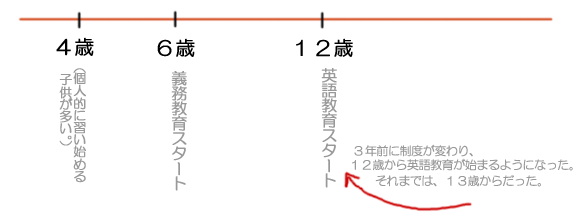
�� �C�����ł́A�`������͏��w�Z1�N��(6��)����5�N���i11�j�܂łł��B
(From 6 years old to 11 years old, every Iranian person goes to elementary school.)
�� �p��́A���{�ł������w�Z1�N���i12�j����K���n�߂܂��B
�iStudents are required to study English at the age of 12. �j
�� ��̊O����-�p��ƃA���r�A��
�C�����v���ȑO�ɂ̓A���r�A��͕K�{�Ȗڂł͂Ȃ��A12����p�ꂪ�������Ă����Ƃ������Ƃ��l����ƁA�����̃C�����ł͉p��̕����d�v������Ă����ƍl�����܂��B�Ƃ��낪���̏͊v���ȍ~��ς��āA�A���r�A�ꂪ12����K�{�ȖڂɂȂ����ʼnp��̏d�v���͒Ⴍ�Ȃ�A13���狳������悤�ɂȂ�܂����B
(Before the revolution, Arabic was not mandatory but instead, English was taught at the age of 12. However, after the revolution, the situation was completely changed - Arabic became mandatory and is taught at 12 and English,at 13. )
������2002�N�ɂȂ��āA��26�N�Ԃ�Ɋv���O�̏|12����p�ꂪ�K�{�Ȗ�-�ɖ߂�܂����B
���̔w�i�ɂ́A�C���^�[�l�b�g�����y���������łȂ��A�C�����ŗL�̎Љ���@-�@��N�w�̑���������Ǝv���܂��B
�܂�A��҂̌ٗp���u�n�o�v���邽�߂ɁA�p����g���č��ێЉ�Ŋ���ł���l�ނ̈琬��
�}���ɂȂ��Ă����Ƃ������Ƃł͂Ȃ��ł��傤���B�C�������A����ɍ��E����Ȃ���A�p�ꋳ��̂������͍����Ă��܂��B
(However,the government changed the system a few years ago. Again, English became an important foreign language in Iran. It's the the first time in 26 years that they started to teach English at 12.
Behind this background, there is a diffusion of IT, but also some social problems- increasing of the population of young people(unemployment). It's beyond capacity to depend on it's oil to export other countries. Having English knowledge could be a solution for sorting out this problem. Iran and Japan is looking for a new English education system, with different background.)
���������ł��傱���ƃC�����̈�ʂ����Ă݂܂��傤�B����
(Now, let's have a look at Iran itself.)
���ؓ��E�A���R�[���̓_����
(Pork and Alcohol is prohibited.)
�C�X�������̋����ɂ̂��Ƃ�A�ؓ���A���R�[���A�����ăC�J�E�^�R�E���낱�̂Ȃ�����H�ׂ邱�Ƃ͋ւ����Ă��܂��B
�iBased on the teachings of Islam, it is prohibited to have alcohol, pork, cuttlefish, octopus, and the fish without scales.�j
|
|

|
|
���T�b�J�[�͍����I�X�|�[�c
(Football is a National Sports)
�C�����ł́A�X�̂��������ŃT�b�J�[������q�ǂ��B�̎p�������܂��B
�T�b�J�[�I��́A�ނ�̖��ł����]�ł��B
(There are many children all over town who play Football.)
|
|
 KYODO PHOTO
KYODO PHOTO
|
���փW���u�i�X�J�[�t�j�ɂ���
(About Hijab- Scarf)
�Ƃ̊O�ł́A�����̓X�J�[�t�����Ȃ���Ȃ�܂���B�u���������͉̂B���v�Ƃ����R�[�����̋�������A�����͂��̔��┯�̖т��B���Ȃ���Ȃ�܂���B�C�����̏��w���̏��̎q�����̒ʂ�I
(Women must wear hejab or chador. In the Qu'ran, it is said that you should wear a scarf outside your house, even little girls.)
|
|

|
�����x�݂͖ؗj���Ƌ��j���ł��B
(The weekend is not Saturday and Sunday, but Thursday and Friday.)
�C�X�������̋����ɂ̂��Ƃ�A���x�݂͖ؗj���Ƌ��j���B�Ȃ̂ŁA�y���͂�������Ɗw�Z�ɍs������A�������肵�܂��B
�iAccording to Islam, Thursdays and Fridays are holidays. Saturdays and Sundays are considered weekdays.)
|
|
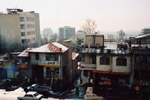
|
|
��PART 7
�C�����̎q�ǂ���1�N��
A typical year for a Iranian kid

1979�N�̃C�����v���ȗ��A������v���Ƃ��Ă���C�����́A���̍s����x���̂قƂ�ǂ��C�X�������ƌ��т��Ă��܂��B���{�̂悤�Ɏq���̓��₻��ɊW����s���Ƃ����͓̂��ɂ���܂���B�q�������ɂƂ��đ�Ȍ��͊w�Z���n�܂�9���A�����Ďq����Ƒ��ɂƂ��đ�ȓ��͐V�N
(�m�[���[�Y�j���n�܂�3��21���ƂȂ�܂��B
�����̐V�N�́A�C�����ŗL�̏@���u�]���A�X�^�[���v�Ɋ�Â��Ă��܂��B
(Since the Iranian revolution in 1979, Iran became the Islamic Republic of Iran. Therefore, most of their annual events and holidays are linked to Islam, and there are no such days as Children's Day or Girl's Day as in Japan. The most important time of the year for children is September, when the new school year starts. In general, March 21 is the most important day of the year, because it is the first day of the new year -"Nowrooze").
|
|

�i�C�����̃J�����_�[�ł��B���N���b�N����Ɗg�債�܂��B)
|
�����ҏW�f������
 |
���C�����Ɠ��{�̗��j�I�ȂȂ���ɂ���
�iAbout the relationship between Irann and Japan -in terms of historical relationship�j
���E�̒��ڂ��W�߂钆�ߓ��Ɉʒu���邱�̍��ł����A���܂������Ă��Ȃ����߁A�ǂ����_��I�ȃC���[�W�����邩�Ǝv���܂��B�������A�V���N���[�h�̍ŏI�n�_�����{�Ȃ�A���̏o���_�̓C�����i�y���V���j�������̂ł��B�����̂����Ȃ̐[�����������̂��A�ޗǁE���q�@�Ɏc����Ă��܂��B�����A�����炭�������ł͂Ȃ��A�l���n���Ă������Ƃł��傤�B
(Because of a lack of information, Iran is shrouded in mystery. But think about it - if the end of the Silk Road was Japan, the starting point must have been, yes, Persia, which is now called Iran. The relationship between the two countries can still be seen in the relics stored in the Shosoin, Nara Pref., in Japan. Perhaps, Persian people came to Japan at the time too.)
�����̕s�v�c-�C�����Ƃ����ƍd���C���[�W�A�y���V���Ƃ����Ƃ��炩���C���[�W�H
(When you hear the word Iran, it brings to mind a hardness and a toughness. But when you hear the word Persia, it sounds soft, doesn't it?)
�u�C�����v�Ƃ����������g���悤�ɂȂ����͔̂�r�I�V����1935�N����B�A���u��������̐N����A���r�A�������g���悤�ɂȂ�A�قƂ�ǂ̐l���@�����]���A�X�^�[������C�X�������ɉ��@���܂����B�������A�����h�ł͂���܂����A�C�����ɂ̓L���X�g���k�A���_�����k�A�]���A�X�^�[���k�����܂��B
('Iran' is used as a country's name from 1935. Since the invasion of Arabs, they are forced to be changed their characters and religion as Arabs. (Athough they are minority, there are still Christianity and Judaism, Zoroastriarism in Iran.)
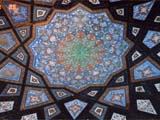 |
�\�ʓI�ɂ̓A���u�̕��������ꂽ���̂́A�C�����l�̍��{�ɂ́u�����̓A���u�����Ƃ͈Ⴄ�v�Ƃ����F����u�y���V�������v�Ƃ��Ă̌ւ肪����܂��B�܂��A�A�[���A�����̂��߁A�\�ʓI�ɂ͉��Čn�̕��ڂ������Ă���l�����������̂ł����A���̓��ʂ͋`���E�l����d��Ƃ������T�^�I�ȃA�W�A�l�Ȃ̂ł��B���́A�u�R�^�c�v��u�t�g���v�Ƃ��������������{�l�Ƌ��ʂ̕����������Ă��܂��B���i�A�������́u���ߓ��v�Ƃ������[���b�p���猩�����t�Ɋ���Ă��邽�߁A���̂��Ƃ��ӊO�Ɋ����܂����A�����A�W�A�Ɉʒu���Ă��邱�Ƃ��l����ƁA���R�̂��ƂƂ����邩�Ǝv���܂��B
(The Iranians have accepted Islam, but they consider themselves different to the Arabs. They are proud to be Persian. Being an Aryan race, their appearance is similar to Europeans, but inside they are typical Asians - "love" and "sentiment" are considered very important. Their culture has many things in common with Japan, such as "kotatsu" and "futon" . When you think about the geography - the two countries are both situated in the same continent of Asia - this should come as no surprise.)
�����t�ƌ��ꋳ��ɂ���
(About the language and it's education)
���p��̓A���r�A��ł͂Ȃ��A�y���V����ł��B�C�����̐l�����̓C�X����������e����ƂƂ��ɁA�K�R�I�ɃA���r�A�������g���悤�ɂȂ�܂����B���̂��߁A�܂�Łu�A���r�A��v�̂悤�Ɍ�����u�y���V����v�ł����A����I�ɂ͑S���Ⴄ�ꑰ�ɑ����Ă��܂��B�i�y���V����́A�p��E�t�����X��ȂǂƓ����C���h���[���b�p�ꑰ�ɑ����܂��B�j
(First of all, the common language in Iran is not Arabic but Farsi. Since the invasion of Islam, the Iranians have been forced to use Arabic script. Farsi may seem like Arabic at first glance, but it belongs to a totally different language group to the Indoeuropean languages. Grammatically, it is similar to English and French.)
�p��͈ȑO�̓O���|�h8�i13�j���狳�����Ă��܂������A3�N�O����O���|�h7�i12�j���狳������悤�ɂȂ�܂����B���̕ω��́A��20�N�ȏ�O�ɋN�����A�C�����v���ȗ��̉���I�Ȃ��ƂƂ����܂��B����ɂ��A�C�����̎q��������12�ŃA���r�A��Ɖp��̗������K���n�߂邱�ƂɂȂ�܂����B�u���S�ɂȂ�Ȃ����낤���H�v�Ǝv���̂ł����A�A���r�A��̓O���|�h1�i���w�Z1�N�j����u�R�[�����v�̎��Ƃƕ��i�̐����ŃA���r�A�������g���Ă��Č�����Ă��邱�Ƃ�����A����قǒ�R�Ȃ��w�ׂ�悤�ł��B�܂��A�p�ꋳ���12����n�܂���̂́A���ł�8���납��l�I�ɏm�ŏK���n�߂Ă�q�������Ȃ�����܂���B
(English used to be taught in Grade 8 - when the children were 13 years old. But for the last three years, it has been taught from Grade 7, when the children are 12 years old. It means that Iranian children have to learn two different foreign languages - Arabic and English - at the age of 12. Isn't it difficult to master two languages at the same time? But it doesn't seem to be a problem. Arabic is already in their culture and they are used to seeing it from Grade 1 in their Qur'an classes. Besides, they used the same script for their native tongue.)
 |
����o�ꂵ�Ă��ꂽ�Z�s�f���������C�n�l�������A���N�����̗�ɂ��ꂸ�A��͂肻�̂��납��p����K���n�߂Ă��܂��B��s�e�w�����̖{������֍s���Ηc���E���������̉p�ꋳ�ނ��R�قǂ��ӂ�A�C�����l�̉p��ɑ���S�x�̍����������������Ƃ��ł��܂��B�C�����̉p�ꋳ��́A�ߔN�̃e�X�g�̌X���ɏ]���A�X�s�[�L���O��X�j���O�Ƃ������Z�\�ɗ͂�����悤�ɂȂ��Ă��܂��B�X�s�[�L���O��X�j���O�̔\�͂�����Ă���Ƃ����_�́A���{�ƂƂĂ��悭���Ă���Ƃ��������ł��B
(Sepideh, Reeyhaneh and Ali, who cooperated with this site this time are good examples of it. If you go to the book stores in Tehran, you will find so many English text books for kids. You wil notice how they are interested in learning English as earlyl age. Following to the chang of the exam's systems, speaking and listening are taught in focus. The forward looking agenda which Japan and Iran faces in English education seems quite similar.)
|
|
|
|
|
|
|
